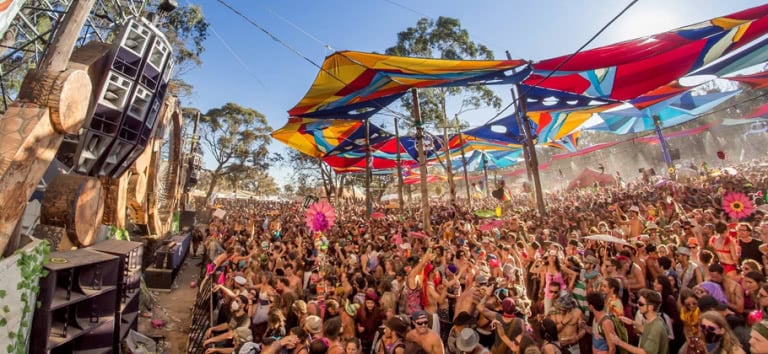With fingers once again being pointed at the festival’s organisers, where does the responsibility lie for preventing this from happening?
Drug-related deaths at music festivals are an altogether devastating occurrence, shaking the music community to the core and leaving families and friends at a loss and searching for answers.
Unfortunately, this past week has seen one of these awful incidents in the death of 22-year-old Jacob Langford, who collapsed at the festival on January 28 after consuming amyl nitrate, a drug commonly found at music events.
It’s believed that Jacob accidentally drank the amyl nitrate, which is typically intended to be inhaled. Ambulances were called at 9pm, and he was pronounced dead an hour later.
Now, in the days and weeks that follow, we begin to once again examine how something like this can be avoided – if it can ever really be avoided – and who’s to blame, with Jacob’s mother and sisters slamming the festival for failing to prevent the death.
“The festival goes way too long without affordable food and drink,” Jacob’s mother Jill and sisters Imogen and Emma told The Herald Sun. “With that much heat and dehydration, it does not equal a safe environment.”
Organisers issued a statement following news of the incident, stating that the festival “considers the safety of patrons a priority and we will continue to cooperate with authorities to determine exactly what happened in this situation.”
It’s a harrowing repetition of a scene we’ve witnessed too many times before at a range of music events, and an understandable call from a family who hope only to stop this from ever happening to anyone else. But, as always, careful consideration needs to be given before laying the blame at the feet of organisers who, in two decades of running the annual event, have been faced with two drug-related deaths among hundreds of thousands of attendees.
Rainbow Serpent’s safety has, of course, been called into question in the past, most notably following the tragic death of a 34-year-old Melbourne man Daniel Buccianti in 2012 as a result of his taking some “very bad acid”.
At the time the festival’s future was placed in serious jeopardy, and Daniel’s mother Adriana Buccianti reacted immediately with an understandable outrage at the festival organisers, and an apparent lack of organisation and policing on their part.
“Drugs took my son,” Ms. Buccianti told The Age. “They [the organisers] should be shut down… If the police didn’t find any drugs at the festival then they were not looking hard enough.”
Soon afterwards, however, with the pain of her son’s death no less ever-present, Ms. Buccianti ended the calls to have the festival shut down. She hoped instead to promote a message of safety and caring, rather than placing the blame entirely on the festival organisers.
“You can’t stop drugs, you can’t stop alcohol,” she said, “but if I can reach 10,000 people with a positive message, that would make more of an impact than to close the event.”
With Ms. Buccianti’s change of heart accompanied by lengthy discussions with the local council and emergency services, Rainbow Serpent was allowed to continue the next year, and hasn’t seen an incident of this sort since.
The following year, council were pleased with the behaviour of the crowd and the safety of the event, despite arrests surrounding what was described by police at the time as a “drug supermarket”, and warnings that Rainbow Serpent would “certainly come under scrutiny for future events.”
That scrutiny has continued, and more arrests have been made in the intervening years but, aside from the unavoidable outliers that come when dealing with crowds of up to 15,000 people, the festival has outwardly been doing all it reasonably can to provide a safe place for its patrons. As many have pointed out, with medical staff on-site and able to provide almost-immediate assistance, the festival was better positioned than many other places to do everything it could to prevent a death like this.
Ultimately, people will go to these festivals, and all sorts of other events, with the intent of taking drugs. People will take risks with the law and their health. Incidents will, no matter how well-prepared an event is, inevitably occur. It’s up to festival organisers to do everything they can to work with authorities and provide adequate resources to attend to these sorts of incidents when they occur but, beyond that, what more can we reasonably ask of these events?
The case has been made repeatedly in recent years to allow people to test the substances they intend to take (and will take regardless), in an effort to cut down on the number of deaths and hospitalisations due to “bad batches”, but it’s an idea that has struggled to gather the necessary support to see it widely implemented.
It may not have helped to save Jacob’s life, but it’s an option that could in many cases prevent drug-related deaths. With news today that Melbourne’s Port Phillip Council is calling on the Victorian Government to trial the testing at festivals and clubs, we may be just a little bit closer to making events like these safer for everyone.
One thing we’re sure of is that stopping these terrible outcomes simply by preventing people from running an event like Rainbow Serpent festival is definitely not the answer.
A Mycause page has been setup in an effort to raise money for Jacob’s family – anyone who’d like to contribute can donate here.
This article was originally published on Tone Deaf – for more Australian music content, check them out here.

































